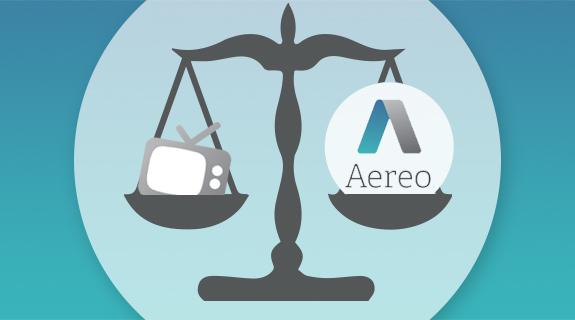Aereo fired back at the broadcasters trying to shut down their start-up local TV streaming service, telling the U.S. Supreme Court in a lengthy 100-page filing that they have broken no laws.
The Big Four broadcasters suing the Barry Diller-backed startup are trying to stop logical technological advancement, Aereo told the court.
“If petitioners believe a technology that operates within existing laws to allow individual consumers to watch television shows petitioners have offered for free is causing them economic harm, they are entitled to ask Congress to change those laws,” Aereo told the Court. “But this Court should not rewrite the Copyright Act in an effort to protect petitioners from lawful and logical advancements in technology or from the economic consequences of their transmitting works for free over the public airwaves.”
Each of the Big Four networks have sued to put a stop to Aereo, which rents out a small antenna to users that transmits broadcast television to multiple devices such as smartphones.
Ther broadcasters say the company is illegally retransmitting television; Aereo says it is simply renting remote antennas.
The specific question before the High Court is “whether a company ‘publicly performs’ a copyrighted television program when it retransmits a broadcast of that program to thousands of paid subscribers over the Internet.”
The Obama Administration has sided with the broadcasters, filing a Friend of the Court brief on their side. And in a rare move, the Justice Department has asked the Supreme Court for permission to argue directly in front of the Justices when the Aereo case is heard April 22, even though the federal government isn’t a party in the case.
Deputy U.S. Solicitor General Edwin S. Kneedler told the Justices in a filing Thursday that the broadcasters suing Aereo have agreed to cede the federal government 10 minutes of their time during oral arguments set for April 22.
“Because the Court’s decision in this case will likely address important questions about the scope of the public-performance right in the context of novel technologies for transmitting and viewing copyrighted audiovisual works using the Internet, the United States has a substantial interest in presenting its views on the question presented,” Kneedler wrote.
Last month a U.S. District Court judge in Utah blocked Aereo’s expansion into that state, saying it appeared the broadcasters would ultimately prevail on their copyright claims. But the service has survived attempts to shut them down in other markets. And Aereo soldiered on after the Utah setback, announcing its launch in the Austin market—its fourth in Texas.
In April 2013, the U.S. Second Circuit Court of Appeals, which covers New York, Connecticut, and Vermont, also refused to shut down the service, prompting the broadcasters to appeal to the High Court in October.
In December, Aereo CEO essentially told the broadcasters to “bring it on.”
“While the law is clear and the Second Circuit Court of Appeals and two different federal courts have ruled in favor of Aereo, broadcasters appear determined to keep litigating the same issues against Aereo in every jurisdiction that we enter”, Aereo CEO Chet Kanojia said at the time. “We want this resolved on the merits rather than through a wasteful war of attrition.”
A decision in the case is expected in June.
Brief Take: Aereo is showing no signs of slowing its expansion or backing off its argument, underscoring its confidence in emerging victorious from the Supreme Court throwdown.
Tags:













































__twocolumncontent.jpg)











